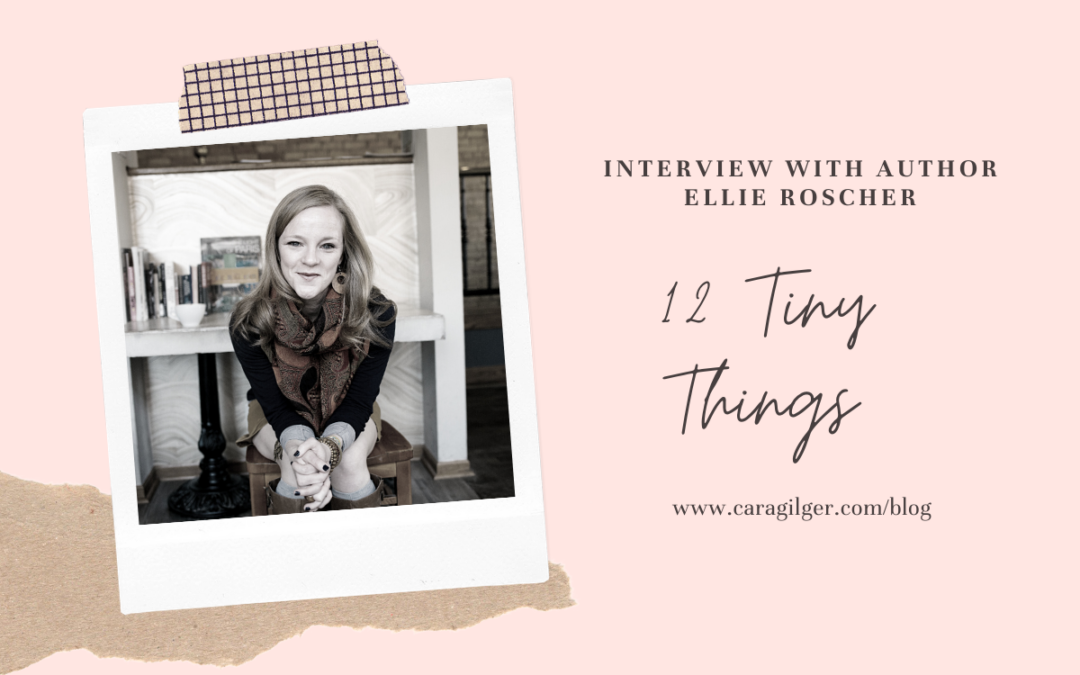I am deeply honored to welcome teacher and writer Ellie Roscher as my first guest for the new author interview series. Not only is Ellie the author of three books including How Coffee Saved My Life: And Other Stories of Stumbling Towards Grace and Play Like a Girl: How a Soccer School in Kenya’s Slums Started a Revolution and her newest release 12 Tiny Things: Simple Ways to Live a More Intentional Life. She is also the host of the podcast Unlikely Conversations, a yoga instructor and writing instructor at The Loft Literary Center and the Minnesota Writing Project. I met Ellie at a conference last year, right before Covid changed the terrain of our lives and made in person conferences a wistful memory. What her bio doesn’t share is what an incredibly gracious and warm presence Ellie exudes.
I wanted to interview Ellie about her recent release 12 Tiny Things because I personally found the book to resonate with where I am as a mother and pastor after nearly a year of pandemic living. My own reevaluation of goals and recommitment to the idea that tiny things can make the deepest impact on my own life meant that I took so much wisdom from the pages of 12 Tiny Things. I hope you enjoy our conversation this week.

Cara Gilger: You and your co-author Heidi Barr have worked on this project for several years, your research was shaped pre-pandemic, but I found it so relevant to our family’s Covid reality. Tell me what inspired 12 Tiny Things when you started the project?
Ellie Roscher: Several years ago, a group of like-minded women, including Heidi and me, got together to wonder, “What is enough?” We asked the question not from a place of scarcity, but a place of abundance. What is just the right amount? We were all trying to live a bit more simply and intentionally. In a society that tells you more work, more money, and more stuff is always better, it felt a tiny bit radical to be challenging that premise and living life on purpose.
12 Tiny Things was born out of the Enough project. Heidi and I were seeing similar trends in our work worlds. Her wellness clients and the young adults in my ministry were feeling paralyzed with overwhelm. They were looking for support in identifying what the first step is to get unstuck and cultivating a sense of peace and joy in their lives. Heidi and I started a Facebook group three years ago and called it 12 Tiny Things. Each month we would choose a theme and post a tiny practice around that theme. The community grew quickly. We were onto something.
Heidi and I both love practicing tiny things and encouraging others to do the same. We are living the belief that little things are big things. We can find rootedness in life on the go. During those three years, I would slip into facilitator mode and skimp on my tiny things practice. The nice thing about tiny practices is you can easily pick them back up again. I would begin again and instantly feel more rooted, living life from my core.
Cara: How has Covid and the changes people are facing in their work and home lives challenged or affirmed the work you’ve started in 12 Tiny Things?
Ellie: As you said, Heidi and I wrote 12 Tiny Things before the pandemic. Three years into my tiny things practice, it was more relevant than ever. Yet, there was a whisper inside me when I picked up the proof to review before publication that said, “Will this hold up in COVID? Will it still be relevant? Or is it too small?” I was immediately struck by how the relevance had deepened with our changed reality.
I deeply believe that now more than ever, tending to our physical and mental health contributes to the common good. That is a new conviction that grew out of our COVID existence. Staying healthy matters to more than just me. 12 Tiny Things supports my health and well-being. The COVID grind is real. Getting through each day is challenging in new ways. Practicing my tiny things every day invites me into the present moment, marks time and keeps me renewed. We are not waiting for life to resume. This is life, and tiny things help me stay awake to this wonderous life.
Cara: I absolutely love the idea that our physical and mental health contributes to the common good. I have found that with us all at home all the time in Covid, it’s the small things that matter most to our thriving even if thinking about what to do seems overwhelming. Where do you suggest starting?
Ellie: One tiny thing I practice every day is to go outside and look all the way up to the sky. It takes one minute of my day, but every time I do it something in my shifts. My body relaxes, I take a full breath, and I see the vastness of the beautiful universe. It reminds me that I am small, and the world is big. It reminds me that my house is not the whole world. Another tiny thing is taking three conscious breaths. It takes a few moments, and every time it works for me as a reset. My body relaxes, I arrive in the present moment, I remember I am alive, and I begin again.
The boundaries between work and home life have dissolved. I love that only one of the twelve themes is work. We are called not just to work, but to our whole lives. It is a book that celebrates holistic vocation at a time when we are realizing that our occupation is to love each other and show up in all sorts of ways.
Cara: In the beginning of 12 Tiny Things you talk about the role of “loving kindness” as a primary component of creating change. This seems so simple but it’s really counterintuitive to the messages we get about “leveling up” and “hustle” and “grind” culture—how do you encourage readers to make the shift from an aggressive model for change to one that is rooted in gentleness?
Ellie: We are human beings, not human doings. Our hustle and grind culture leads to burn-out and self-deprecation. It treats us as consumers first and not spiritual, embodied beings who were created good and beautiful. 12 Tiny Things is a gentle invitation to subvert the lies and live from a sense of enough. Our first chapter is on SPACE. What is one area in your life where you would like more space: your email, closet, mind, garage, or calendar? The invitation in that chapter is an invitation to ENOUGH. What is the myth driving us toward more instead of enough, toward clinging instead of letting go?
For me, I overfill my calendar because I believe that I am more when I do more. That is a lie, and when I can name it as a lie I immediately start living out of a heightened sense of enough. The tiny thing, then, is to say no to one thing. By exploring the invitation to enough with gentle self-love, I find the courage to say no to one calendar invite that does not bring me joy. That tiny thing is actually quite enormous. Now I have more space. I can either dwell in the potential and power of the space itself, or I can intentionally fill that space with something on purpose. Life is no longer happening to me. More is not always more. If we can gently explore what is underneath the current, what is driving the striving for more, real personal transformation can happen one tiny step at a time. Living from our root system and the truths about our beauty, our enough-ness and our perfect imperfection that dwell under the surface, we can find a sustainable pace and cultivate the life we want.
Cara: I love that each chapter ends with a Body Practice and reflection questions to guide readers through this work. Is there a Body Practice that has been particularly meaningful to you in the new year?
One tiny body practice is to pull your chin toward your throat just a bit, and then reach the crown of your head toward the sky. This small shift changes my entire disposition. I feel the alignment in my spine and the space created by elongating my spine. Those two sensations trigger to my being to live out of alignment, to move from my core literally and figuratively. It reminds me that it is ok to take up space. It is ok to stand tall. When my chin juts out, it is a body manifestation of this striving for more, extending myself out until I am spread thin, looking outside of my body for happiness, and spending too much time out in the future. When I pull my chin back in alignment, I come back to home base. It is an invitation from my physical body to my being to remain in the present, find happiness in what I do have here and now, dwell in a sense of stillness, tap into the depth of my being, and recognize all I need is right here inside me. I can live with a calm sense enough. It is a mindful one inch shift in my body that washes over me and changes how I move through my day.
Cara: As someone that writes about faith formation, I deeply appreciated that your section on spirituality was expansive, including practices and perspectives outside of the Christian tradition. Why was it important for you to integrate such a broad lens to talk about spirituality in this book?
Ellie: The young people I work with in a Christian setting are skeptical of organized religion. They do not want to be associated with the homophobia, misogyny, xenophobia and white supremacy alive in the vocal minority of certain strains of US Christians. Yet these young people long for a meaningful spiritual life and a spiritual practice. They want to live their life on purpose, and they want they faith to flow from Sunday morning into all the nooks and crannies of their lives. They formed their identities with smart phones in their pockets, knowing global hurt and oppression at an intense level and wondering what their role in in the healing. I wrote 12 Tiny Things with them in mind. I did not want them to get hung up on Christian lingo that is loaded for them. Our 12 Tiny Things community is diverse and rich. Christians and church communities can opt into the larger community while using the shared vocabulary from the book in their church settings.
I am a practical theologian, and I love engaging with 12 Tiny Things as a Christian. I want other Christians and church communities to engage with me. I wrote a 12-week church study guide that brings in the themes of 12 Tiny Things in conversation with 12 Bible stories that I love. This resource is a simple, free downloadable 12 week study for churches. It is malleable and works well on ZOOM and in person. Churches can expand or contract it, use it for small groups, Wednesday nights, women’s groups and teens and young adults. On our Resource Page of our website, we also have meditations, a small group guide, a 30-day calendar and a daily Lenten calendar for folks to use. My hope is that church communities can bring the strength of their relationships and life-giving semantics to the 12 Tiny Things structure and meanwhile, folks who are looking to deepen their spiritual life outside the structure of institutional religion can joyfully do so.
Cara: Many of my readers identify as women and mothers with young children, their days are both joyful and exhausting. If you were to say “hey start here, right here, with this tiny thing” where would you recommend they start?
Ellie: I love this question. I wrote 12 Tiny Things when my youngest was an infant after two miscarriages, two hard full-term pregnancies, one hard labor and two abdominal surgeries, and an extended stint in the PICU when my youngest was a newborn. I was tired in mind, body and spirit. I was surviving. We find ourselves in seasons of surviving and seasons of thriving. In it all, we can claim rootedness. Heidi and I spent a lot of time created practices that were so tiny, offensively tiny, that no one could claim they were too busy. It is a place to start. Not all the tiny things will work for you, but there is an appendix of tiny things to choose from, and just a couple can build a sense of embodied simplicity and intentionality regardless of how exhausting our days are.
Allow me to give a couple of options of where to start. Choose just one, and try it for a month.
- Spend the first five minutes of your day away from screens. As you wake up to the new day, get in touch with your body and your immediate surroundings. Identify yourself as a being in the analog world first. If you grab for your phone right away, try getting an alarm clock and charge your phone in a different room.
- Nod to your machines. As you start the coffee maker, start your car or boot up your computer, give it a nod of recognition. We have a relationship to our stuff, and there are so many machines in our lives that we take for granted yet make our days easier so we can choose delight.
- Decide what your body really wants to drink first thing in the morning. When we are tired, we can lean on routine and get stuck in ruts. Maybe you have had coffee first for years when your body actually wants a glass of water before coffee. By taking a moment to check in with not what you think you want but what you really want, it sets a tone for your day where your desire matters.
Looking all the way up at the sky and taking three conscious breaths, mentioned previously, are great places to start, too. Our social media community on Facebook is also a great place to start. For some folks on Instagram, it is just a gentle pause in their feeds. It is a gentle reminder to breath and put down the scrolling if it is not serving you. For others, it is a rich space to share ideas and support each other on the journey. Parenting can be isolating, and this groups is a light touch to help you feel not quite so alone.
Cara: If readers want to connect with this work, where can they find you?
Ellie: You can find me on Facebook, Twitter and Instagram and you can find 12 Tiny Things, our community for connecting people to this work on the 12 Tiny Things website, as well as Facebook and Instagram. As I mentioned before, we offer these spaces to create gentle reminders in your feed and build community.



Recent Comments